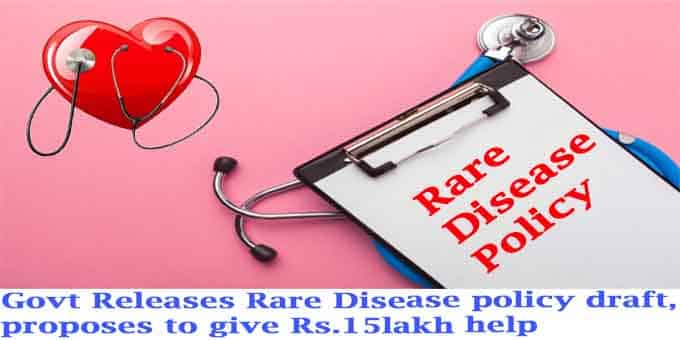On January 14, 2020 the govt has released the National draft policy on Rare Disease in which financial support of Rs. 15 lakh will be provided under the Rashtriya Arogya Nidhi scheme for one-time treatment of rare diseases. Rare Disease Policy draft:
Rare Disease Policy draft:
i.Beneficiaries: The scheme benefit is limited to people below Poverty Line (BPL) and also 40% of the population eligible as per Ayushman Bharat-Pradhan Mantri Jan Arogya Yojana(AB-PMJAY) norms for treatment in government tertiary hospitals only.
ii.Centers of Excellence Institutes: Certain medical institutes will also be notified by the Union Ministry of Health (MoH) as Centers of Excellence for Rare Diseases. These institutes include
- All India Institute of Medical Sciences(AIIMS)- New Delhi; Maulana Azad Medical College(MAMC), New Delhi; Sanjay Gandhi Post Graduate Institute of Medical Sciences(SGPGIMS), Lucknow, Uttar Pradesh; Post Graduate Institute of Medical Education and Research(PGIMER), Chandigarh and 4 more institutes.
- Cost of treatment: The patients cost of treatment will be met out by these Centers of Excellence by donations received through the online digital platform. For this, govt will set up the platform for voluntary individual and corporate donors to contribute to the treatment cost.
- Suggestions on the policy: The health ministry has put up about the draft policy in its site and is also open to suggestions by February 10, 2020.
iii.National Registry for Rare Diseases: Govt plans to set up National Registry for Rare Diseases at Indian Council of Medical Research (ICMR) to create a database of various rare diseases. This has been decided keeping in view lack of availability of data on rare diseases, resource constraints etc.
Rs.80lakh to be paid to AIIMS:
Recently on January 16, 2020 the Delhi High Court(HC) has issued notice to Health ministry to release pending payment of upto Rs 80 lakh to AIIMS accrued over 13 months for rare disease treatment for the patients.
Rare diseases:
i.Group 1 diseases: They are categorised under group 1 and will be funded under the scheme. The disease includes Lysosomal Storage Disorders (LSDs), immune deficiency disorders, chronic granulomatous disease, osteopetrosis, Fabry’s disease and liver or kidney transplant.
- Diseases having Constraints under the scheme: Resource constraints were cited in the policy to certain diseases like Gaucher’s disease, Spinal Muscular Atrophy, Hurler Syndrome and Wolman disease as they require lifelong treatment.
ii.Most commonly reported diseases: These include Haemophilia, Thalassemia, Sickle-cell Anaemia and Primary Immuno Deficiency in children, auto-immune diseases, Lysosomal storage disorders etc
iii.Current cost of rase disease treatment: It has been estimated that for a child weighing 10 kg, the annual cost of treatment for any rare diseases varies from Rs 10 lakh to above 1 crore per annum. The drug dose and cost also increases with age.
- About 450 diseases have been recorded in India from tertiary care hospitals that are globally considered as rare diseases
National Policy for Treatment of Rare Diseases (NPTRD):
Previously the health ministry formulated the National Policy for Treatment of Rare Diseases (NPTRD) in July, 2017. When this policy was introduced, there prevailed lack of clarity regarding the cost effectiveness, share of expenditure between centre and states etc. Hence the policy was decided to be reframed & the ministry constituted an expert committee in November 2018 to review it.
About Ministry of Health and Family Welfare(MOHFW):
Founded- 1976.
Headquarters- New Delhi.
Union minister- Dr.Harsh Vardhan. (Constituency- Chandndi Chowk, Delhi)
Minister of State(MoS)- Ashwini Kumar Choubey.





